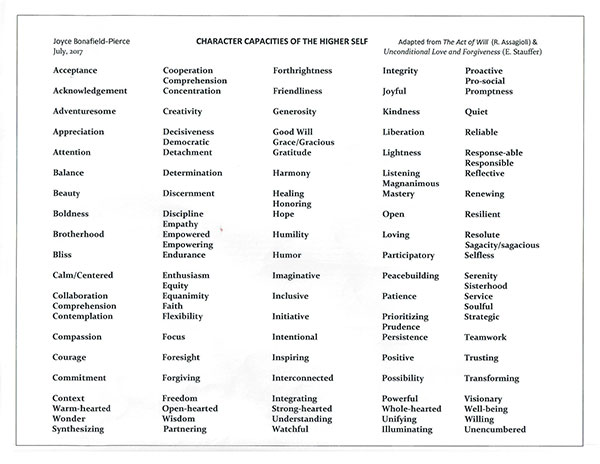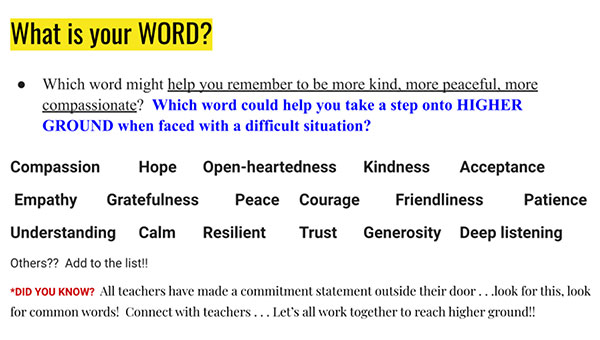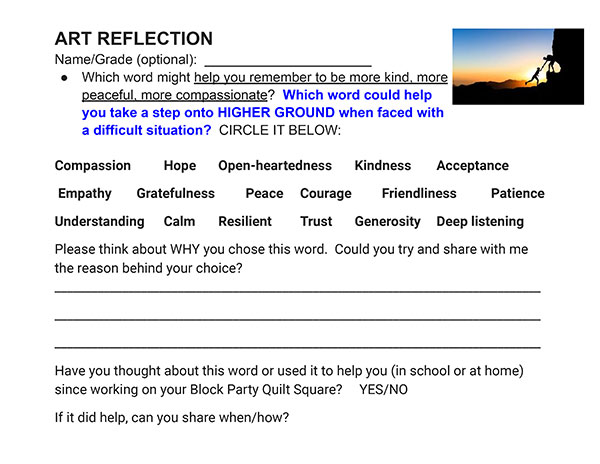Higher Ground: An Introduction
Caren: I’d like to introduce our Higher Ground team of educators, peacemakers, and writers: Ellie Roscher, Renee Dauk-Bleess, Joyce Bonafield-Pierce, and me, Caren Stelson. The four of us have been reading, learning, growing, and experimenting with the concept of Higher Ground, a term further developed by Dr. Joyce Bonafield-Pierce. In this article and the next three articles to come, we will explore paths to peace and peacebuilding in classrooms and schools through the lens of Higher Ground and the power of story and art.
What is Higher Ground?
Joyce Bonafield-Pierce’s life time work as a social worker, therapist, and educator is to help adults and children shift into our higher selves — to be our best selves — as we learn to be peacemakers and builders in our communities. The concept of Higher Ground is an ability to move to a higher level of seeing and responding. How can we learn to grow into a greater awareness of the needs of all so we are able to act more often “on behalf of the greatest good, respond compassionately to the suffering of others, move beyond our own comfort levels to respond to the human needs of those different from ourselves”?
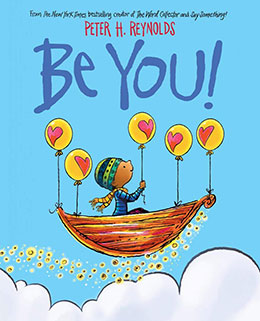 Peter H. Reynolds’ delightful picture book, Be You, helps children see themselves stepping onto Higher Ground. He writes directly to children, “Be curious, adventurous, patient, brave, also understanding and kind.” Looking at Reynolds’ picture book through the lens of Higher Ground, his list of words are Higher Ground values. Reynolds writes to his young audience, “My wish for you — no matter where your journey leads — is for you to always be You!” Yet, we all know, being our Higher Ground selves, as Reynolds wishes, is not always an easy goal to meet.
Peter H. Reynolds’ delightful picture book, Be You, helps children see themselves stepping onto Higher Ground. He writes directly to children, “Be curious, adventurous, patient, brave, also understanding and kind.” Looking at Reynolds’ picture book through the lens of Higher Ground, his list of words are Higher Ground values. Reynolds writes to his young audience, “My wish for you — no matter where your journey leads — is for you to always be You!” Yet, we all know, being our Higher Ground selves, as Reynolds wishes, is not always an easy goal to meet.
Going Deeper into Higher Ground
Joyce: It’s not easy to stay on Higher Ground. Our own ego’s needs and demands keep us, at best, on Middle Ground. But all of us can and do slip onto Lower Ground — our unconscious, reactive, “win-lose,” blaming selves, where we act out our trauma and anger with little regard for its impact on others. If we’re aware that’s what we have done, we can apologize and make amends. As mature adults, we normally operate from Middle Ground — our conscious, more rational, less reactive selves, where we are more willing to negotiate, problem-solve, coöperate, and where most of us settle comfortably to do the mundane tasks of life.
But we, at times, can step up to Higher Ground — where our most conscious selves reside, where we aim beyond our self-interests and take intentional action on behalf of someone or a group — to repair relationships, treat someone with fairness and kindness, or seek justice. We call this prosocial behavior, acting on behalf of something larger than ourselves to help someone in need without thinking of our own needs or limits.
For the “Adults on the Rug,” Higher Ground for Us and Modeling It for Our Children
Ellie: None of us are born onto Higher Ground — it’s learned behavior. As babies, we are born completely dependent, and have the instinct to seek out our basic needs. As we grow into children, the world is what we see right in front of us. Then, in older childhood, we begin to think for ourselves, look at the wider world and ask big questions like, “Why are some people cruel? And “Why is the world unfair?” An ethical self forms.
As children’s ethical intelligence develops, parents and educators can work with children to deepen their sense of self, the world, and their place in it. Each moment, we and children can choose to live out of Higher Ground at a heightened state of awareness with a sense of the reality around us. Higher Ground is living out the Kent Keith quote, “Do good anyway.” It is acting from Michelle Obama’s understanding of “When they go low, we go high.” We do not have to respond in kind. In the heat of the moment, we can learn to pause and ask ourselves, “How can I go to Higher Ground here?”
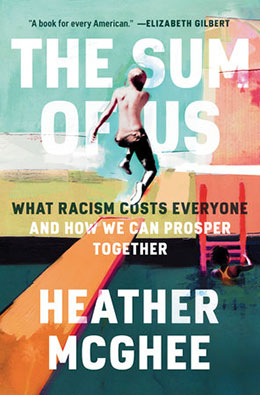 In The Sum of Us, Heather McGhee argues that our country was founded on a zero-sum mindset. If you get more, that must mean I get less. “From the economy to the most personal of relationships to the revolution itself, America relied on a zero-sum model of freedom built on slavery” (p 12). Today, we continue to hoard our assets, forgetting that power and love can grow, forgetting that my doing well is not tied to you struggling. It did not work then and it is not working today. The counties that relied more on slave labor have the lowest per capita incomes today.
In The Sum of Us, Heather McGhee argues that our country was founded on a zero-sum mindset. If you get more, that must mean I get less. “From the economy to the most personal of relationships to the revolution itself, America relied on a zero-sum model of freedom built on slavery” (p 12). Today, we continue to hoard our assets, forgetting that power and love can grow, forgetting that my doing well is not tied to you struggling. It did not work then and it is not working today. The counties that relied more on slave labor have the lowest per capita incomes today.
Heather McGhee is calling us to Higher Ground. To eradicate racism and turn the economy around, we have to drop our zero-sum game mentality and reach higher, believing that we will all do better together. Former Minnesota Senator Paul Wellstone’s adage, “We all do better when we ALL do better,” captures this sentiment. “A functioning society rests on the web of mutuality, a willingness among all involved to share enough with one another to accomplish what no one person can do alone” (p 21).
As we adults spend more time living from our Higher Ground, prioritizing collaboration, cultivating imagination, and working toward common good, we can invite our children to join us, choosing Higher Ground in our classrooms and homes.
Higher Ground Art with Art Teacher Renee Dauk-Bleess
Caren: In Be You, Peter Reynolds writes:
Go ahead.
Be yourself.
Be the best version of you.
Each day is
A new chance to be more you.
Can “being the best version of you” be taught? Renee Dauk-Bleess has been exploring this Higher Ground idea in her 3 – 6 grade art classrooms at Oak Crest Elementary in Belle Plaine, Minnesota.
Renee has been an elementary teacher since 1990 and is now an art specialist in a 3 – 6 grade school in a small town in central Minnesota. In the midst of the COVID pandemic, Renee witnessed the lives of her students and their families upended, staff cohesion unraveled, and social interactions frayed. Renee began to search for ways to intentionally shift and teach through the lens of peace. How could she help her students steady themselves, learn to self-regulate, find more compassion for themselves and others, and grow into peacemakers and builders through art? Discussions with Joyce and the idea of Higher Ground got Renee thinking.
Joyce offered Renee a word bank of characteristics that described Higher Ground values.
Inspired, Renee created a version of Joyce’s “Character Capacities of the Higher Self” for her 3 – 6 grade students with a list that looked like this:
Renee began: Have you heard the expression “taking the high road”? Her students nodded. What does that mean? Have you ever found yourself in a difficult situation, and you or someone else have “taken the high road’ to help resolve the conflict?
Renee shared her simplified Higher Ground bank of words and invited her students to choose one word on the list to “put in their pockets,” to claim as their own, to remember the power of that word in a difficult situation.
Once students had chosen their words, it was time for the “Block Party Collaborative Mural art project” to unfold.
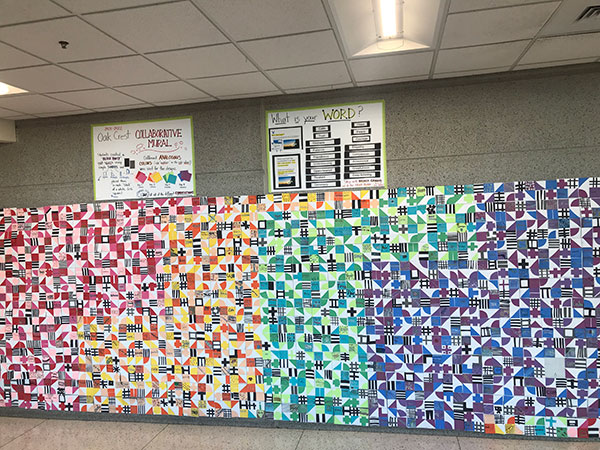
From Renee’s journal: “Finally finished putting up almost 500 quilt squares last Friday for our “Block Party Collaborative Mural” outside the art room! Each individual quilt square features a special WORD: a word that will help students remember to be more kind, more peaceful, more compassionate — a word that will help them step onto Higher Ground when faced with a difficult situation.
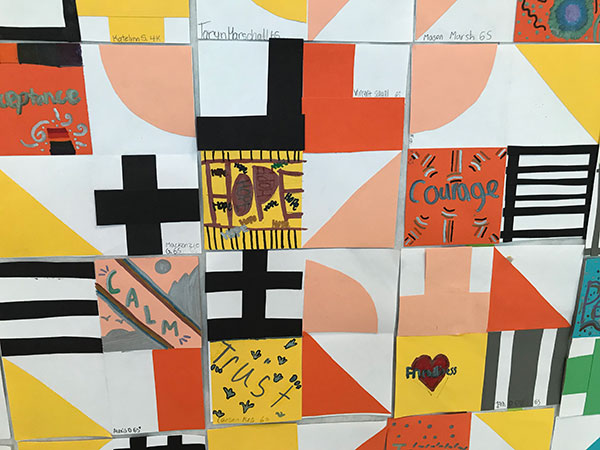
Renee color-coded squares so students could find their individual signed art work while admiring the entire mural that brought the whole school together.
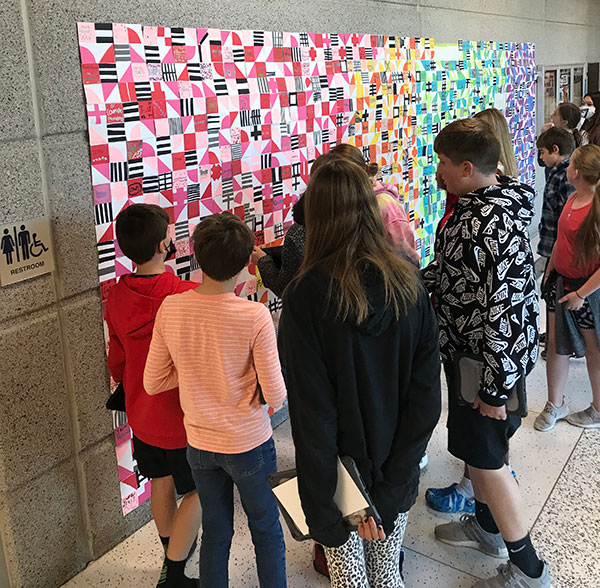
To further community building, Renee encouraged kids to find, not only their Higher Ground square, but to look for other students who chose the same word as they did — a conversation waiting to happen.
Curious, Renee wanted to know why children chose a specific word. She designed a Higher Ground questionnaire to find out.
From Renee’s journal: Today in art doing the Higher Ground lesson, I asked if kids felt comfortable sharing the reason WHY they had chosen their word in class … One student raised his hand. “Patience. Because it’s something hard for me, and I want to try and be better with that.” Later, he asked if he could also write: “Take a deep breath” above his word …
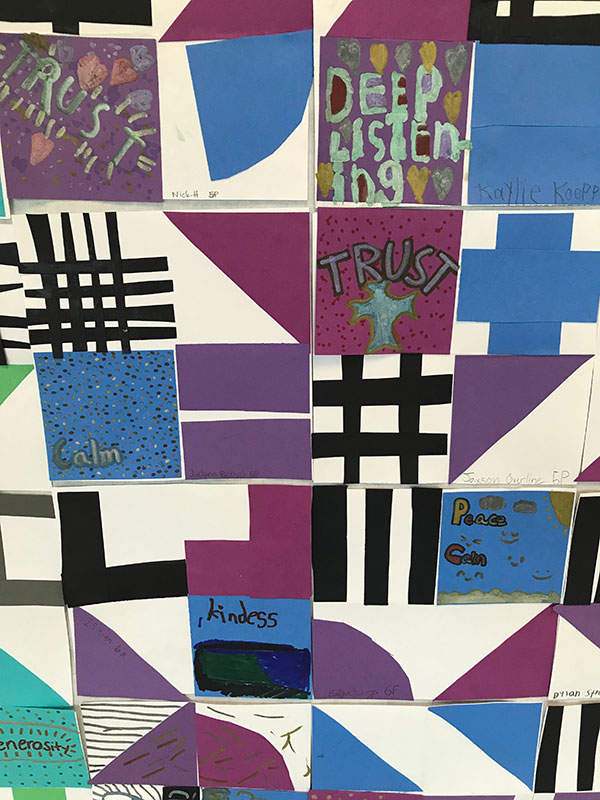
I went around as students were working quietly, asking them privately if they would be willing to share with me the reason behind their word:
- HOPE: “Because this school year, I haven’t really had any hope in school or even in myself, so I want to remember to have hope and think about that word.”
- EMPATHY: “I remember learning this word in 3rd grade, and I know it’s something really important. I want to try and show empathy.”
- TRUST: “I’m dealing with a lot of trust issues with other people … ”
- COMPASSION: “Because everyone should have just a little bit more compassion.”
- PATIENCE: “It’s important to have patience and not get really upset. My stepdad sometimes gets really angry, so I need to use patience when he gets that way.”
- CALM: “Because I have 3 brothers and have to take my time sometimes and share and I need to be more calm.”
- GENEROSITY: “I think about my uncle, who once helped out a woman and gave her $5 so she could get on the bus. Not many people are generous, but when you are, it makes such a difference.”
- PEACE: “When I look at all of the words on this list, they all make me think of peace, and that’s how I want to be.”
As students reflected on their choice of Higher Ground words, Renee tallied the words most often chosen.
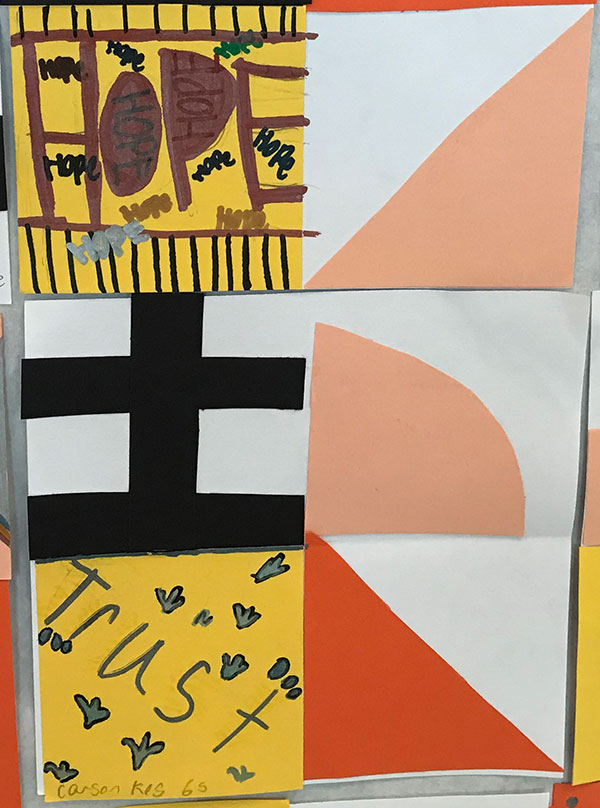
Of all the words listed in Renee’s Higher Ground word bank, hope and trust were the two words children needed most to put in their pockets, to step onto Higher Ground, to carry them through their days. Hope and trust are fundamental. Human beings need both to become successful adults, grow into peacemakers, and build stronger communities where everyone can find a place to belong.
Peter Reynolds, in Be You, reminds us to be true to ourselves. Heather McGhee, in The Sum of Us, reminds us that we need each other. Joyce Bonafield-Pierce and Renee Dauk-Bleess remind us that we can learn to step onto Higher Ground, be our true selves, and help one another. It’s possible. It’s necessary. It’s essential.
_________________________
For each Peace-ology post, Caren, Ellie, Renee, and Joyce partner to learn and explore the meaning of peace by talking and listening with each other. If you’d like to share your ideas about peace, books, and children, please share your comments here, visit our websites, or connect with Joyce and Renee about their Higher Ground work.

